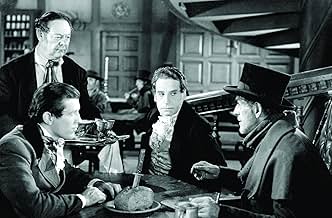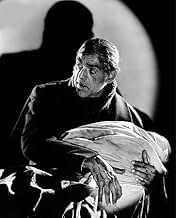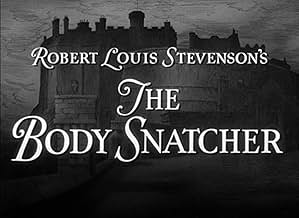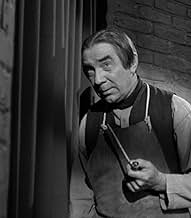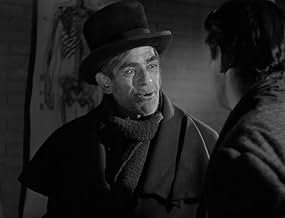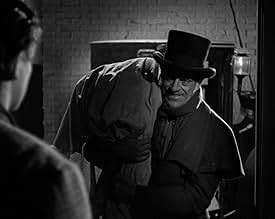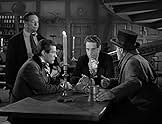IMDb-BEWERTUNG
7,3/10
10.864
IHRE BEWERTUNG
Ein skrupelloser Arzt und sein junger Student werden ständig von ihrem mörderischen Lieferanten illegaler Leichen belästigt.Ein skrupelloser Arzt und sein junger Student werden ständig von ihrem mörderischen Lieferanten illegaler Leichen belästigt.Ein skrupelloser Arzt und sein junger Student werden ständig von ihrem mörderischen Lieferanten illegaler Leichen belästigt.
- Regie
- Drehbuch
- Hauptbesetzung
- Auszeichnungen
- 3 Nominierungen insgesamt
Paula Corday
- Mrs. Marsh
- (as Rita Corday)
Ted Billings
- Townsman
- (Nicht genannt)
Bobby Burns
- Mourner
- (Nicht genannt)
Robert Clarke
- Richardson - Medical Student
- (Nicht genannt)
Aina Constant
- Maidservant
- (Nicht genannt)
Mary Gordon
- Mrs. Mary McBride
- (Nicht genannt)
Carl Kent
- Gilchrist - Medical Student
- (Nicht genannt)
Milton Kibbee
- Dan
- (Nicht genannt)
Ethan Laidlaw
- Pub Patron
- (Nicht genannt)
Jim Moran
- Angus - Horse Trader
- (Nicht genannt)
Jack Welch
- Boy
- (Nicht genannt)
Empfohlene Bewertungen
One could easily argue, as I surely will attempt to do so, that this film, The Body Snatcher, based on the classic story by Robert Louis Stevenson and produced by the wonderfully creative and inventive producer Val Lewton, is the home of Boris Karloff's best performance. Some will argue that his portrayal of Frankenstein's creature was his greatest role, and I would not argue with that. But his role as Cabman Gray is his best performance as an actor. It gives us a chance to see the real Boris and his entire acting range. He plays with relish a character wicked as can be , yet full of contradictions. This villainous rogue that steals bodies from graves and then creates bodies through murder is given an amiable side. He is the most interesting character in the story. He is the core of the story, and it is all due to Karloff's wonderful and witty portrayal. The story is excellent as our the other actors in the film, most notably Henry Daniell as the doctor abused and tormented by Karloff and past secrets. Although this was the last film to have both Karloff and Lugosi, it is a lopsided affair as Lugosi is given very little screen time and an even smaller role as a blackmailing servant. The best scene with both of them is the murder scene of Lugosi's character, and it is one last glimpse of the two great boogeymen sharing the screen once more together. Outstanding film, competent direction, and excellent acting make this film one of the better horror films of the 40s and one of Karloff's finest moments on the screen period.
A sinister coach driver John Gray (Boris Karloff) supplies corpses for Dr. Wolfe MacFarlane (Henry Daniell) and his assistant Donald Fettes (Russel Wade), but things start going pair shape when Dr. Wolfe finds out more about where these corpses are coming from, as supplies are running short and he tries to get rid of Gray, who doesn't share his buddy's (or Toddy's) thoughts. Another thing on their minds is that a mother of a young girl with a bad vertebra that's getting worse asks Dr. Wolfe for his help, but he refuses at first. But with the constant bugging from assistant Fettes, he finally goes ahead with the operation.
The more I watch this film, the better it seems to get! Val Lewton's "The Body Snatcher", which is set in the year 1831, Edinburgh - is an excellently well-handled thriller that holds SUCH great performances from the likes of Boris Karloff, Henry Daniell, Russel Wade, Edith Atwater and Bela Lugosi. What shines and drives the film other than its performances - is the intelligent screenplay and hypnotic atmosphere and setting that reeks of death and coldness. The foggy, empty and dark streets of Edinburgh during the night have an approaching sense of menace, especially when Karloff is on screen. An impressive Boris Karloff as John Gray the Cabman evokes such tension and depth. He always makes his presence distinguishable, with the scenes he's in being the most interesting. His appearance and body language has some unsettling effect - in a captivating way. His performance in my opinion is up there with the likes of "The Mummy" and "Bride Of Frankenstein". I read a lot positive remarks towards Karloff's performance, but IMHO Henry Daniell was equally as good. He's great as the troubled Dr. Wolfe, who is haunted by Gray. You could say he was the backbone of the film. When these two shared the screen, is when the fireworks certainly occurred. Russel Wade is quite sympathetic in his role, as the reluctant assistant who gets drawn into Dr. Wolfe's mess. Edith Atwater delivers a sound performance and there's basically a neat cameo role by Bela Lugosi.
I wasn't bored, but for some people it might be a tad too slow and real talkative, as what this film thrives on, is its vivid literature, well-rounded characters and potently gripping confrontations, especially between Wolfe and Gray. The story has its moments of psychological suspense that steadily develops into a thrilling and powerful finale (that has the usual thunderstorm evident). The way the final lines of dialogue were set up in that sequence is truly unnerving. Also throw in elements of greed, guilt and pride and how it gets the better of people. So there is a moral to all of this. Sudden shocks and jolts fill the film, but definitely not cheap ones. Mostly the deaths are implied, though there is great use of sound in those situations eg. The sound of a horse trotting. It's very effective! It isn't stylish or spirited directing by Robert Wise, but to cap it off, he achieves a downright inventive and believable movie piece.
My only small complaint is that it could've been a much darker film, but it's the lightness of the sub-plot about the crippled girl that "slightly" spoilt it. Was it trying for an innocent point of view?Nonetheless, it's still my favourite Lewton/Karloff film, to date.
"Never get rid of me!"
The more I watch this film, the better it seems to get! Val Lewton's "The Body Snatcher", which is set in the year 1831, Edinburgh - is an excellently well-handled thriller that holds SUCH great performances from the likes of Boris Karloff, Henry Daniell, Russel Wade, Edith Atwater and Bela Lugosi. What shines and drives the film other than its performances - is the intelligent screenplay and hypnotic atmosphere and setting that reeks of death and coldness. The foggy, empty and dark streets of Edinburgh during the night have an approaching sense of menace, especially when Karloff is on screen. An impressive Boris Karloff as John Gray the Cabman evokes such tension and depth. He always makes his presence distinguishable, with the scenes he's in being the most interesting. His appearance and body language has some unsettling effect - in a captivating way. His performance in my opinion is up there with the likes of "The Mummy" and "Bride Of Frankenstein". I read a lot positive remarks towards Karloff's performance, but IMHO Henry Daniell was equally as good. He's great as the troubled Dr. Wolfe, who is haunted by Gray. You could say he was the backbone of the film. When these two shared the screen, is when the fireworks certainly occurred. Russel Wade is quite sympathetic in his role, as the reluctant assistant who gets drawn into Dr. Wolfe's mess. Edith Atwater delivers a sound performance and there's basically a neat cameo role by Bela Lugosi.
I wasn't bored, but for some people it might be a tad too slow and real talkative, as what this film thrives on, is its vivid literature, well-rounded characters and potently gripping confrontations, especially between Wolfe and Gray. The story has its moments of psychological suspense that steadily develops into a thrilling and powerful finale (that has the usual thunderstorm evident). The way the final lines of dialogue were set up in that sequence is truly unnerving. Also throw in elements of greed, guilt and pride and how it gets the better of people. So there is a moral to all of this. Sudden shocks and jolts fill the film, but definitely not cheap ones. Mostly the deaths are implied, though there is great use of sound in those situations eg. The sound of a horse trotting. It's very effective! It isn't stylish or spirited directing by Robert Wise, but to cap it off, he achieves a downright inventive and believable movie piece.
My only small complaint is that it could've been a much darker film, but it's the lightness of the sub-plot about the crippled girl that "slightly" spoilt it. Was it trying for an innocent point of view?Nonetheless, it's still my favourite Lewton/Karloff film, to date.
"Never get rid of me!"
Robert Louis Stevenson has had a rough going in modern literary tastes. When he died in 1894, he was rightly regarded as one of the finest writers and stylists of his day - for grown-up readers! However, the enmity of a one time friend , W.E.Henley, diminished his reputation. Henley said that Stevenson was too superficial, and was basically a writer of pot-boilers. This view was somewhat softened into a "boy's" writer of adventure stories (TREASURE ISLAND and KIDNAPPED were the titles that usually were pushed as boy's novels).
Actually Stevenson was far from a writer for youths. TREASURE ISLAND has the perplexing, exasperating figure of Long John Silver as it's anti-hero, chum and protector of Jim Hawkins, but mutineer, pirate leader, and murderer. KIDNAPPED does the same with Aleck Breck Stewart, whose weaknesses (such as gambling and drinking) ruin a political mission. He was hardly a simple adventure novelist, anymore than the real Jules Verne was simply a French chap with an outlandish imagination regarding scientific progress.
The movies have done well by Stevenson. TREASURE ISLAND and KIDNAPPED have been made several times, as was THE MASTER OF BALLENTRAE. His novella DR. JECKYLL AND MR. HYDE was made more frequently than any other title of his. In 1931, it earned it's star (Fredric March) the Best Actor Oscar. Even some of the lesser known works have gotten into film: THE WRONG BOX (one of two novels written with Stevenson's stepson Lloyd Osbourne) became a marvelously funny comedy about a scramble over a legacy. THE EBB TIDE was a film with Ray Milland, Lloyd Nolan, Oscar Homolka, and Barry Fitzgerald, and a good television version was made with Robby Coltrane in it. The tales of Prince Florizel of Bohemia from THE NEW ARABIAN NIGHTS became TROUBLE FOR TWO with Robert Montgomery, Rosalind Russell, Frank Morgan, and Reginald Owen. Finally there is this nice gem, THE BODY SNATCHER. It is based on one of Stevenson's best short stories, a moody, psychological drama about the evil that is committed supposedly in the way of greater good.
In most of these films the scripts start out with the novel or short story, but branch out into their own scenarios. Gray, the murderous but sympathetic cab man in the film is (in the story) a drunk who MacFarland actually hates. When he kills Gray for his corpse (for medical study) MacFarland is actually settling a score. The conclusion of the story is similar to the film, except that Gray's mysterious resurrection to confront the frightened MacFarland does not lead to his death, but to his total demoralization. He flees into his own oblivion at the conclusion.
Stevenson was very into history including crime and the vagaries of the law.
It has been noted in the other posts that this story owes much to the crimes of the West Port murderers of 1827-28, William Burke and William Hare (in the film Gray sings a tune about them to the drunken (and doomed) blackmailer Joseph). But this is not unusual for Stevenson. The final blow to Alan Breck Stewart's mission in KIDNAPPED is the hue and cry against him as a suspect in the Appin Murder of 1752, which led to the judicial murder of James "of the Glen" Stewart. The latter story is told in the sequel novel CATRIONA. DR.JECKYLL AND MR.HYDE is based on the story of Deacon Brodie, a wealthy cabinet maker and town councilor of Edinburgh in the 1770s and 1780s, who was a burglar at night, and who was eventually hanged on a a scaffold he had built for the city. Even in his best novel (the unfinished WEIR OF HERMISTON)the title character of Hanging Judge Weir is based on that legendary jurist Lord Braxfield, a man of strong prejudices and harsh statements.
THE BODY SNATCHER was not the first historical movie by Val Lewton's production unit. But THE BODY SNATCHER was the first of three films (all first rate) starring Boris Karloff (the others being ISLE OF THE DEAD and BEDLAM). THE BODY SNATCHER manages to set the period of the 1830s pretty well, although an early distance shot is from some routine film stock and (if you look carefully) shows a car in the distance near a flock of sheep outside of Edinburgh Castle.
The acting is actually quite good, in particular Karloff's Gray and Daniell's astonishing MacFarland. Henry Daniell was one of the best screen villains of his period, in films like CAMILLE (as Baron De Varville) and THE SEA HAWKE (as Wolfingham). He also could do comic villains (Garbitsch in Chaplin's THE GREAT DICTATOR). But this is a rare occasion where he actually shared a full screenplay with a fellow actor.
Daniell's MacFarland is in a battle to the death with Karloff's Gray, one that his mistress knows will destroy both. Both have flaws (Daniell's intellectual arrogance; Karloff's willingness to kill anyone who is expendable). But both are human too. Daniell is aware that his operation on the little girl is "flawless" but nothing improves her ability to walk. All he can do is harshly order the little girl to walk (and she doesn't). Gray sneers at him in their famous scene in the tavern, where Daniell explains his confusion at the failure of a successful operation and hits on the actual missing aspect - Gray knows that the basic cause of life is not something that MacFarland can fix, but the basis of life itself (God or nature itself - something beyond a puny mortal like the doctor). But Gray, for his cynicism and murderous ability, does wish the "wee" one could walk. Oddly enough, hearing his horse move causes the poor girl to walk finally.
It is a fine movie, and gave both Karloff and Daniell a shining moment on the screen.
Actually Stevenson was far from a writer for youths. TREASURE ISLAND has the perplexing, exasperating figure of Long John Silver as it's anti-hero, chum and protector of Jim Hawkins, but mutineer, pirate leader, and murderer. KIDNAPPED does the same with Aleck Breck Stewart, whose weaknesses (such as gambling and drinking) ruin a political mission. He was hardly a simple adventure novelist, anymore than the real Jules Verne was simply a French chap with an outlandish imagination regarding scientific progress.
The movies have done well by Stevenson. TREASURE ISLAND and KIDNAPPED have been made several times, as was THE MASTER OF BALLENTRAE. His novella DR. JECKYLL AND MR. HYDE was made more frequently than any other title of his. In 1931, it earned it's star (Fredric March) the Best Actor Oscar. Even some of the lesser known works have gotten into film: THE WRONG BOX (one of two novels written with Stevenson's stepson Lloyd Osbourne) became a marvelously funny comedy about a scramble over a legacy. THE EBB TIDE was a film with Ray Milland, Lloyd Nolan, Oscar Homolka, and Barry Fitzgerald, and a good television version was made with Robby Coltrane in it. The tales of Prince Florizel of Bohemia from THE NEW ARABIAN NIGHTS became TROUBLE FOR TWO with Robert Montgomery, Rosalind Russell, Frank Morgan, and Reginald Owen. Finally there is this nice gem, THE BODY SNATCHER. It is based on one of Stevenson's best short stories, a moody, psychological drama about the evil that is committed supposedly in the way of greater good.
In most of these films the scripts start out with the novel or short story, but branch out into their own scenarios. Gray, the murderous but sympathetic cab man in the film is (in the story) a drunk who MacFarland actually hates. When he kills Gray for his corpse (for medical study) MacFarland is actually settling a score. The conclusion of the story is similar to the film, except that Gray's mysterious resurrection to confront the frightened MacFarland does not lead to his death, but to his total demoralization. He flees into his own oblivion at the conclusion.
Stevenson was very into history including crime and the vagaries of the law.
It has been noted in the other posts that this story owes much to the crimes of the West Port murderers of 1827-28, William Burke and William Hare (in the film Gray sings a tune about them to the drunken (and doomed) blackmailer Joseph). But this is not unusual for Stevenson. The final blow to Alan Breck Stewart's mission in KIDNAPPED is the hue and cry against him as a suspect in the Appin Murder of 1752, which led to the judicial murder of James "of the Glen" Stewart. The latter story is told in the sequel novel CATRIONA. DR.JECKYLL AND MR.HYDE is based on the story of Deacon Brodie, a wealthy cabinet maker and town councilor of Edinburgh in the 1770s and 1780s, who was a burglar at night, and who was eventually hanged on a a scaffold he had built for the city. Even in his best novel (the unfinished WEIR OF HERMISTON)the title character of Hanging Judge Weir is based on that legendary jurist Lord Braxfield, a man of strong prejudices and harsh statements.
THE BODY SNATCHER was not the first historical movie by Val Lewton's production unit. But THE BODY SNATCHER was the first of three films (all first rate) starring Boris Karloff (the others being ISLE OF THE DEAD and BEDLAM). THE BODY SNATCHER manages to set the period of the 1830s pretty well, although an early distance shot is from some routine film stock and (if you look carefully) shows a car in the distance near a flock of sheep outside of Edinburgh Castle.
The acting is actually quite good, in particular Karloff's Gray and Daniell's astonishing MacFarland. Henry Daniell was one of the best screen villains of his period, in films like CAMILLE (as Baron De Varville) and THE SEA HAWKE (as Wolfingham). He also could do comic villains (Garbitsch in Chaplin's THE GREAT DICTATOR). But this is a rare occasion where he actually shared a full screenplay with a fellow actor.
Daniell's MacFarland is in a battle to the death with Karloff's Gray, one that his mistress knows will destroy both. Both have flaws (Daniell's intellectual arrogance; Karloff's willingness to kill anyone who is expendable). But both are human too. Daniell is aware that his operation on the little girl is "flawless" but nothing improves her ability to walk. All he can do is harshly order the little girl to walk (and she doesn't). Gray sneers at him in their famous scene in the tavern, where Daniell explains his confusion at the failure of a successful operation and hits on the actual missing aspect - Gray knows that the basic cause of life is not something that MacFarland can fix, but the basis of life itself (God or nature itself - something beyond a puny mortal like the doctor). But Gray, for his cynicism and murderous ability, does wish the "wee" one could walk. Oddly enough, hearing his horse move causes the poor girl to walk finally.
It is a fine movie, and gave both Karloff and Daniell a shining moment on the screen.
As of this writing, I have seen four of the nine Val Lewton DVD Horror Collection films and this one was, by far, the best.
Henry Daniell, Boris Karloff, Edith Atwater,Russell Wade, Sharyn Moffet and Bela Lugosi all acted well. I had forgotten that Karloff was a decent actor, not just some Frankenstein monster who couldn't deliver a line. He had a creepy voice, too, which lent itself nicely to horror films. I just found him fascinating here.
In addition, this movie had a well-known director, Robert Wise, and the story was adaption of a Robert Louis Steevenson. So, you see, this film had good bloodlines, pun intended. This was not some schlocky Ed Wood B-film. This movie is a high class affair.
I found it more of a crime story than anything else as a doctor (Daniell), trying to further his knowledge and needing human specimens (dead) to continue his research, has his graveyard supply cut off to him and then has to have his helper (Karloff) kill people to provide him the bodies. Meanwhile, a young and more moral student of the doctor, gets wind of what's happening and doesn't share his mentor's view that the "ends justify the means."
At any rate, this a keeper. Like the other Lewton films I've seen, it's well- photographed, too. I can only hope a few of the five I haven't seen yet are this good.
Henry Daniell, Boris Karloff, Edith Atwater,Russell Wade, Sharyn Moffet and Bela Lugosi all acted well. I had forgotten that Karloff was a decent actor, not just some Frankenstein monster who couldn't deliver a line. He had a creepy voice, too, which lent itself nicely to horror films. I just found him fascinating here.
In addition, this movie had a well-known director, Robert Wise, and the story was adaption of a Robert Louis Steevenson. So, you see, this film had good bloodlines, pun intended. This was not some schlocky Ed Wood B-film. This movie is a high class affair.
I found it more of a crime story than anything else as a doctor (Daniell), trying to further his knowledge and needing human specimens (dead) to continue his research, has his graveyard supply cut off to him and then has to have his helper (Karloff) kill people to provide him the bodies. Meanwhile, a young and more moral student of the doctor, gets wind of what's happening and doesn't share his mentor's view that the "ends justify the means."
At any rate, this a keeper. Like the other Lewton films I've seen, it's well- photographed, too. I can only hope a few of the five I haven't seen yet are this good.
In 1831, in Edinburgh, the prominent doctor and professor Dr. Wolfe 'Toddy' MacFarlane (Henry Daniell) buys corpses for his studies and classes of anatomy from the notorious cabman John Gray (Boris Karloff), who is also a body snatcher. When his talented student Donald Fettes (Russell Wade) tells that he will quit medical school since his family cannot afford to support him, MacFarlane hires him as his assistant to permit Fettes to proceed his studies. Fettes meets a little girl that cannot walk anymore due to a coach accident, and he tries to convince Dr. MacFarlane to operate her but the doctor is reluctant. Soon Fettes discovers that Dr. MacFarlane has a secret from his past and Gray blackmails him. When Fettes learns how Gray obtains the corpses for Dr. MacFarlane, he has an inner conflict and does not want to continue as Dr. MacFarlane's protégée. But isn't it too late?
"The Body Snatcher" is a dark and gloomy horror tale with a creepy story about ethic in medicine, or how far a doctor should go in his researches. Boris Karloff has a magnificent performance, maybe the best I have ever seen of this actor. The direction of Robert Wise is sharp and the cinematography in black and white is impressive. My vote is seven.
Title (Brazil): "O Túmulo Vazio" ("The Empty Grave")
"The Body Snatcher" is a dark and gloomy horror tale with a creepy story about ethic in medicine, or how far a doctor should go in his researches. Boris Karloff has a magnificent performance, maybe the best I have ever seen of this actor. The direction of Robert Wise is sharp and the cinematography in black and white is impressive. My vote is seven.
Title (Brazil): "O Túmulo Vazio" ("The Empty Grave")
Wusstest du schon
- WissenswertesAlthough based on a fictional short story by Robert Louis Stevenson, the author came up with the idea from actual events occurring in 19th century England and Edinburgh, Scotland in 1827, called the West Port murders of 1828.
At that time, medical schools lacked sufficient funding or the resources to provide their students with cadavers for study. Seeing a financial opportunity there, William Burke suggested to his landlord, William Hare, that they sell the body of a recently deceased boarder to Dr. Robert Knox, an instructor at a Surgeon's Square anatomy school. Knox was grateful to have a specimen for his class and Burke and Hare began a lucrative operation that quickly moved from grave-robbing to murder. They killed their victims by suffocating or "burking" them. Estimates were that they murdered up to 28 people, preying on drunks, prostitutes, and the destitute elderly.
- PatzerAt the beginning, a castle is shown during the credits, then "In Edinburgh In 1831-"; then after that there is a closer view of the castle and a horse and carriage. Two or three automobiles are parked next to the castle.
- Zitate
Cabman John Gray: I am a small man, a humble man. Being poor I have had to do much that I did not want to do. But so long as the great Dr McFarlane comes to my whistle, that long am I a man. If I have not that then I have nothing. Then I am only a cabman and a grave robber. You'll never get rid of me, Toddy.
- Crazy CreditsClosing credits epilogue: "It is through error that man tries and rises. It is through tragedy he learns. All the roads of learning begin in darkness and go out into the light" Hippocrates of Cos
- Alternative VersionenFive cuts were made by the British censors on its initial release, mainly references to Burke and Hare, the original bodysnatchers. This cut print has been the only one available in the UK until 1998, when a complete version appeared on the budget video label 4-Front.
- VerbindungenEdited into Mondo Lugosi - A Vampire's Scrapbook (1987)
- SoundtracksHuntingtower
(uncredited)
("When Ye Gang Awa, Jamie")
(Traditional Scottish folk song)
sung by Donna Lee
Top-Auswahl
Melde dich zum Bewerten an und greife auf die Watchlist für personalisierte Empfehlungen zu.
- How long is The Body Snatcher?Powered by Alexa
Details
- Erscheinungsdatum
- Herkunftsland
- Sprache
- Auch bekannt als
- Robert Louis Stevenson's Der Leichendieb
- Drehorte
- Produktionsfirma
- Weitere beteiligte Unternehmen bei IMDbPro anzeigen
Box Office
- Budget
- 125.000 $ (geschätzt)
- Laufzeit1 Stunde 18 Minuten
- Farbe
- Seitenverhältnis
- 1.37 : 1
Zu dieser Seite beitragen
Bearbeitung vorschlagen oder fehlenden Inhalt hinzufügen



